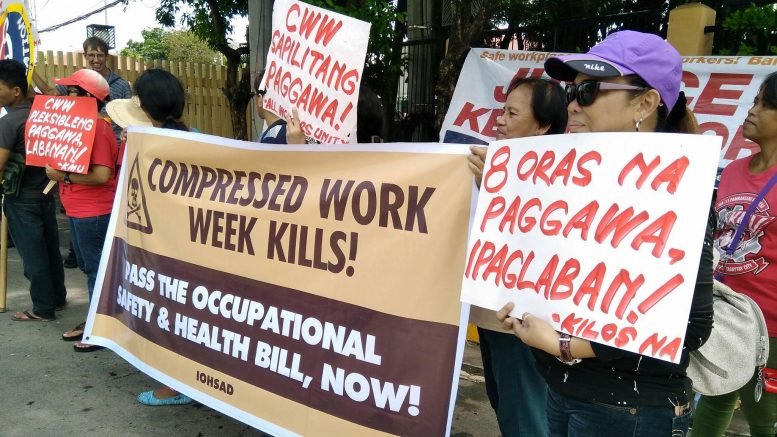The compressed workweek scheme is a flexible work arrangement wherein the normal workweek is reduced to less than six (6) days with 48 hours still being the normal total work hours per week. This means that the normal workday is increased to more than eight hours without corresponding overtime premium.
A bill aimed to institutionalize the compressed work week scheme was passed at the House of Representatives and is pending before the Senate. The Flexible Work Arrangement Bill (Senate Bill 1571) stems from the House Bill that went as far as amending several provisions in the Labor Code: Article 83 on normal hours of work, of Article 87 on overtime work, and of Article 91 on right of weekly rest day.
At current 8-hour workday, 46.1% of Filipino workers (31 million) have not been receiving the minimum wage (PSA, 2016). The average daily basic pay in the country is only Php 400.95 or Php 278.44 in real terms, with the lowest minimum wage of Php 235 (Region IV) equivalent only to Php 156.25 in real terms. These amounts are very far from the family living wage of Php 1,130 per day, indicating a 79% wage gap. In a study conducted by EILER in two urban poor communities (2015), 77% of the women in the areas are engaged in informal work as “sari-sari” store owners, sidewalk vendors (of drinks and snacks), garlic peelers and laundry-women. About 22% are jobless while only a very small percentage are wage and salary workers. Households in depressed communities do not have sufficient income as most earn below Php 100 a day. In a separate study, EILER found that one in five households has incident of child labor in hazardous industries of plantations and mines. A total of 48% of the child laborers surveyed earn less than Php 150 per day and endure work up to 24 hours in mines.
Labor flexibilization and consolidation of neoliberal policies have been the response of the capitalists in the wake of global economic crisis. These policies are wielded in state-enforced rules and guidelines directed to weaken unions in collective bargaining and ensure profit. The compressed workweek scheme as a form of labor flexibilization removes regulatory statutes on wages and benefits. It further promotes contractualization, depresses wages, denies workers their security of tenure, and weaken the bargaining rights of unions. It is unmistakably another neoliberal attack on the rights of workers in favor of big local and foreign businesses. Meanwhile the legitimate demands for living wages, decent and regular jobs, and better conditions in the workplace remain unheeded.

